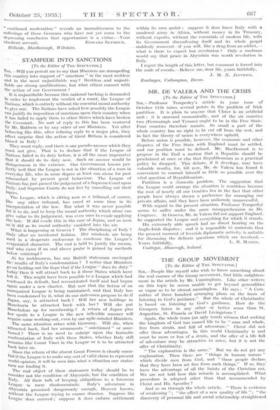STAMPEDE INTO SANCTIONS • [To the Editor of TUE SPECTATOR.]
SIR,--Will you permit me to say that Ministers are stampeding this country into support of " sanctions " in the most reckless and in the most unjustifiable way? Reckless and unjusti-, liable arc strong qualifications, but what others consort with the action of our Government ?
It ii.iirijristifiatile because this national backing is demanded. in Order to implement the verdict of a court, the League of Nations, which is entirely without the essential moral authority to give one. The Italians have asked how possibly the League, can justify its imposition of sanctions upon the* country when. it has failed to apply them to 'other States which have broken the covenant. No sort of reply to this has been ventured by Mr..Baldwin or by any other of our Ministers. Yet after behaving like this, after refusing reply to a major plea, they affect 'surprise that the action of Great Britain is considered biased in Italy ! . They must reply, and there is one pseudo-answer which they Inust not give. That is to declare that if the League of Nations failed in its duty before, it is all' the more imperative that it should do its duty now. Such an answer would be tlisingenuous in the extreme. Our Government knows per f0,tiy Well that the League is not in the situation of a man in everyday life, who in some degree at least can atone for past Misconduct by present good behaviour. The League of Nittiori has just passed the judgement of a Supreme Court upon and'Stipreme Courts do not live by cancelling out their lalises. • The League, which is sitting now as a tribunal, of course, like any other 'tribunal, has erred at some time in its interpretation' of the law. But what it was never' possible for it to do, and to keep the moral authority which alone can give value to its judgement, was even once to evade applying the It did evade this in the case of Japan,' and as soon u'elt 'did so its 'moral authority vanished into the air.
'What is' happening at Geneva ? The disciplining of Italy ? ()MY after incidental' fashion. Her misdeeds are being Used M a 'desperate endeavour to condense the League's c*mtfilited•dmaracter. The end is held to. justify the means, and. "iirhiy 'cares if an end above praise is gained by methods below'' contempt ? Ai for recklessness, hag any British statesman 'envisaged tii:i'resnIts of Italy's condemnation ? I notice that Ministers go omi' holding out the hope that if the League'" does its duty " toda'Y theult will attract back 'to it those States which have left it'. ' This might have been poisible to a League which had confessed its default, had reconstituted itself and had begun again under .a new charter. But now that the fiction of an unimpaired League is being maintained, and that Italy has been condemned by it, what do our statesmen propose to do if Japan, -say; is attracted back ?.. Will her new holdings in Manchuria be attracted back with her ? Will she put Manchukuo up for membership ? A return of Japan plus her spoils to a League in the new inflexible manner will require some working-out,.even by our agile-mitided'Ministers.
The • same situation arises with Germany. Will she, when' attracted back, find her armaments " sanctioned " or sane: tioned ?, There is no need to enlarge upon the fantastic confrontation of Italy with these States, whether Italy still remains like Count Vinci in the League or is to 'be attracted back later on.
Since the return of the absent Great Powers is clearly essen- tlatif the League is to make any sort of valid claim to repreient World-opinion, it will 'be seen into what a situation our States- Men are leading it.
The• real object of these statesmen today; should be to consider not the condition of Abyssinia; but the condition of ...Italy. All their talk of .:keeping obligations to a forsworn League. mere rhodomontade. adventure in AbYssinia promised dangerously enough, Heaven. knows; Without .the League 'trying to ensure disaster. SuppoSe the Leagrie does succeed ; suppose it does enforce settlement' within its own ambit.; suppose it does leave Italy with a sundered army in 'Africa; without money in its Treasury, without. exports, without time essentials of modern life, with its Government disconfessing itself and its whole gospel shddenly removed—if you will, like a drug from an addict,— what is there to expect but ,revolution ? Only a madman would say that peace in "AbYisinia was worth revolution in Italy.
I regret the length of this letter, but comment is forced into the scale of events.—Believe 'me, dear Sir, yours faithfully, Easthayes, Cullompton, Devon. J. ,M. N. JEFFRIES.


























































 Previous page
Previous page